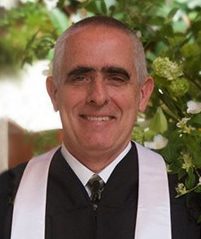As the 2024 election season winds its painfully polarized way to another American election day, among the most volatile issues in the fractious orbit of political conversation are border security and immigration.
As a public policy question, immigration is complex and complicated — an enormously difficult subject about which much dialogue and debate is needed.
However, how we should speak of and respond to immigrants is a moral, spiritual matter about which there is no debate or question.

Chuck Poole
We should speak of and respond to immigrants exactly as we would wish to be spoken of and responded to if we were immigrants — with respect and dignity compassion and kindness.
For people of my faith, people of other faiths and people of no faith but good faith, that is not up for debate. We don’t need to have a dialogue about that. We just need to practice that thoughtful, mindful way of speaking of and responding to immigrants. And if we have spoken of and responded to immigrants in ways that fail the test of respect and dignity, compassion and kindness, we need to repent, ask forgiveness and begin again in a new way.
For example, we might begin by practicing the sort of careful speech that takes the time to use the phrase “immigrant persons” instead of referring to non-native born residents as “migrants” or “aliens.” To take the time to use the phrase “immigrant persons” is to keep foremost the fundamental truth that those who have come to America from other places are, first of all, persons, children of God beloved by God, with whom we share the image of God.
That kind of mindful, thoughtful speech isn’t political correctness; it is spiritual correctness. For those who long to follow Jesus, careful speech concerning our immigrant neighbors isn’t wokeism, it’s baptism.
Many of us know that Leviticus 19:18 says we are to love our neighbor as we love ourselves, but fewer of us remember that in the same chapter, 16 verses later, we are given the more specific, very particular command to love those who are immigrants as we love ourselves.
Add to that the words of Jesus, who is reported to have said, in Matthew 7:12, that all the holy words in all the holy books can be summed up in a single simple sentence, “Treat all others as you wish all others to treat you,” not to mention Leviticus 25:23, which says since all the land in all the world belongs to God, in the eyes of God we are all immigrants and it is clear that xenophobia, nativism and racism have no place in our hearts, in our words, in our national conversation concerning border security and immigration policy.
There is much to discuss and debate concerning the complexities of immigration policy, but there is no debate concerning how we should speak of and respond to our immigrant neighbors — with the same dignity, hospitality and respect we wish all others to offer us.
Xenophobia, fear of the other, cast out by xenoamora, love of the other.
Chuck Poole retired in 2022 after 45 years of pastoral life, during which he served churches in Georgia; North Carolina; Washington, D.C.; and Jackson, Miss. He has served as a visiting preacher and teacher on the campuses of multiple universities, seminaries and divinity schools. He was the founding teacher of the Wood Street Bible Class in Jackson, which he led for 21 years. The author of nine books, numerous published articles, one gospel song and the lyrics to three hymns, Chuck has served as a “minister on the street” and as an advocate for interfaith conversation and welcome. He and his wife, Marcia, now live in Birmingham, where he serves on the staff of Together for Hope.


